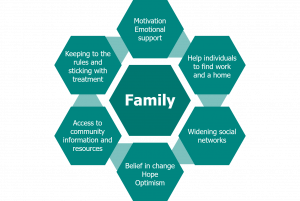Family relationships
Key findings
- Associations with offending and reoffending
- Criminal behaviour concentrates in certain families.
- Poor parenting can lead to antisocial traits and offending in later life.
- Frequent changes of caregiver are associated with later offending.
- Supporting desistance
- The value of positive family relationships is also evident within the research literature, with families being powerful allies to those working in probation.
- Prison visits to adult prisoners can improve family relationships, and are associated with lower reoffending.
- Parenting programmes aimed at increasing skills and responsibility are associated with lower reoffending.
Background
The importance of engaging with the family to support successful rehabilitation has long been acknowledged by criminal justice and allied professionals. Family relationships were given new focus by the ground-breaking review by Lord Farmer in 2017 which pulled together the evidence base and urged a renewed focus by Government and all working in prisons, probation and youth justice services.
Key statistics are as follows:
- of those supervised in the community on 30 June 2018 with a completed OASys (Offender Assessment System), 71 per cent of women and 60 per cent of men had relationships identified as an offending-related need
- in a 2008 study, there was a 39 per cent reduction in reoffending for prisoners who received family visits compared to those who did not
- in a 2012 study, 40 per cent of prisoners reported that support from their family would help prevent them reoffending.
Summary of the evidence
Associations with offending and reoffending
A parental criminal conviction has been found to be the best predictor of future offending by a 10-year-old child. A 2007 study reported that about two thirds (63 per cent) of those with a convicted father were convicted themselves by the age of 32, compared to about a third (30 per cent) of those without a convicted father. Only six per cent of families in England and Wales accounted for half of all convictions. This has been termed the ‘inter-generational transmission of crime’.
The quality of parenting is crucial to a child’s prospect of leading a crime-free life. Poor parenting can lead to pro-criminal associations and learning pro-criminal attitudes, with lack of parental oversight allowing young people to associate with antisocial associates without censure. Disruptions to parenting have also been found to be associated with large increases in offending. One study reported that boys who had experienced two or more caregivers before the age of 10 were twice as likely to be convicted of a violent crime.
Supporting desistance
The value of positive family relationships is also evident within the research literature. Families can be a strength to those with convictions and they can be powerful allies to those working in probation. Research has demonstrated that families can:
- provide motivation and support to cease offending
- help with adherence to substance misuse treatment and supervision requirements
- encourage self-belief and engender hope in the possibility of change
- widen access to information and resources, especially employment and housing.

Family visits to adults in prison can be highly beneficial. Prisoners who receive visits from family have been found to be more likely to have successful employment and accommodation outcomes and are much less likely to reoffend.
Parenting programmes for men in prison are highly beneficial in improving their skills, and those who attend are much less likely to reoffend. The Fathers Inside programme is an intervention for male prisoners, which aims to improve their parental responsibilities through drama, fiction and group discussion. Ministry of Justice analysis found that the programme participants had a reoffending rate around half that of the control group.
In our core adult inspection programme, there are questions related to the focus on family and relationships, where identified as an offending-related factor, at both the planning and intervention stages. Data from our 2018/2019 inspections is set out in the figure below – a family/relationships need had been identified in about half (48 per cent) of the cases.

Conversely, family and relationships was considered an important strength/protective factor for the individual service user in two-fifths (40 per cent) of the cases. In 61 per cent of these cases, the delivered services sufficiently built upon this strength.
Our 2014 Resettlement Thematic Report (with HM Inspectorate of Prisons and Ofsted) indicated that families are not included enough in the resettlement process. Families needed to be more involved in sentence planning, especially coming up to release, with family involvement a missed opportunity for preventing homelessness following release.
Bonta, J. and Andrews, D.A. (2017). The Psychology of Criminal Conduct. London: Routledge.
Farringdon, D.P., and Welsh, B. C. (2007). Saving Children from a Life of Crime: Early Risk Factors and Effective Interventions. Oxford: Oxford University Press.
Jardine. C. (2017). The role of family ties in desistance from crime. London: Families Outside.
Justice Data Lab (2016). Re-offending behaviour after participation in Safe Ground’s Fathers Inside programme. London: Ministry of Justice.
Lord Farmer. (2017). The Importance of Strengthening Prisoners’ Family Ties to Prevent Reoffending and Reduce Intergenerational Crime. London: Ministry of Justice.
Williams, K., Papadopoulou, V. and Booth, N. (2012). Prisoners’ Childhood and Family Backgrounds: results from the Surveying Prisoner Crime Reduction (SPCR) Longitudinal Cohort Study of Prisoners. Ministry of Justice Research Series. London: Ministry of Justice.
Back to Specific areas of delivery Next: Substance misuse
Last updated: 02 February 2021



